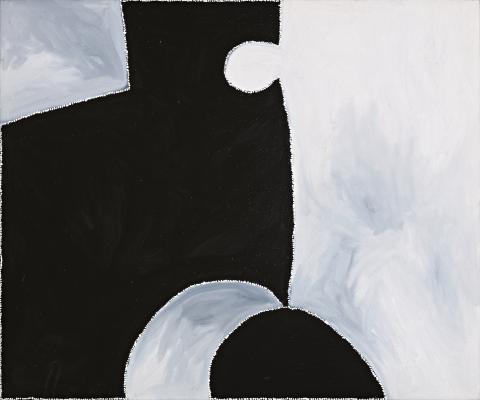FIG TREE HOLE, 2005
PADDY NYUNKUNY BEDFORD
ochres and pigments with synthetic binder on linen
150.0 x 180.0 cm
bears inscription verso: artist’s initials, date and Jirrawun cat. PB 8 2005.235
Jirrawun Arts, Wyndham, Western Australia
Gene and Brian Sherman collection, Sydney
Storer, R., Paddy Bedford, Museum of Contemporary Art, Sydney, 2006, p. 158 (illus.)
Paddy Bedford played a major role in what may well be described as an aesthetic revolution in contemporary indigenous art. A leading member of a group of artists hailing from the township of Warmun in the Kimberley region of Western Australia, Bedford was often referred to as the “new" Rover Thomas and significantly, began painting on canvas after fellow artist Freddie Timms established the Jirrawun Aboriginal Art group at Rugun (Crocodile Hole) in north-east WA in 1997.
His stark, minimalist style stood out dramatically from the more colourful and detailed indigenous work flooding the Australian art market during the 1980s and ’90s. With his work featured in major museums around the country and abroad, Bedford was notably also among a handful of artists commissioned for a major work within the Musée du Quai Branly in Paris in 2006.
Fig Tree Hole, 2005 is an archetypal Bedford with its dramatic monochromatic contrasts and hints of pure figuration. His simple, minimalist approach was in stark contrast to the more characteristic byzantine dot paintings that had become so-well known before the advent of the Jirrawun movement.
‘Paddy Bedford has taken the mantle of the Kimberley minimalism pioneered by Rover Thomas to new heights. His use of wet-on-wet painting techniques and gestural mark making elevated his work to a new contemporary space, while as a senior lawman, he was always true to culture and only ever painted his father’s and his mother’s country and the events that occurred there’ observes gallerist William Mora, who exhibited Bedford.
Sadly, one of those events illustrated the darker side of Australian history. Bedford, known by his nickname, Goowoomji, was born at Bedford Downs Station in the East Kimberley around 1922, where several years earlier, a group of his Gija relations had been murdered by strychnine poisoning in retaliation for the killing of a milking cow. In his own, often oblique way Bedford made this tragedy a bedrock subject in his work, and indeed explored the theme most prominently alongside other artists in the memorable group exhibition, Blood on the Spinifex, held at the Ian Potter Museum of Art in Melbourne in 2002–2003. As a senior lawman, Bedford had been involved in painting as part of ceremony all his life.
ASHLEY CRAWFORD
